best animals for homesteading
Having a homestead is a great way to be more proactive in the food you eat. And in order to raise that food, you will need to have animals. This article on the best animals for homesteading will give you an overview of the most popular, along with the pros and cons of each.
Homesteading tips for raising the food and dairy your family enjoys.
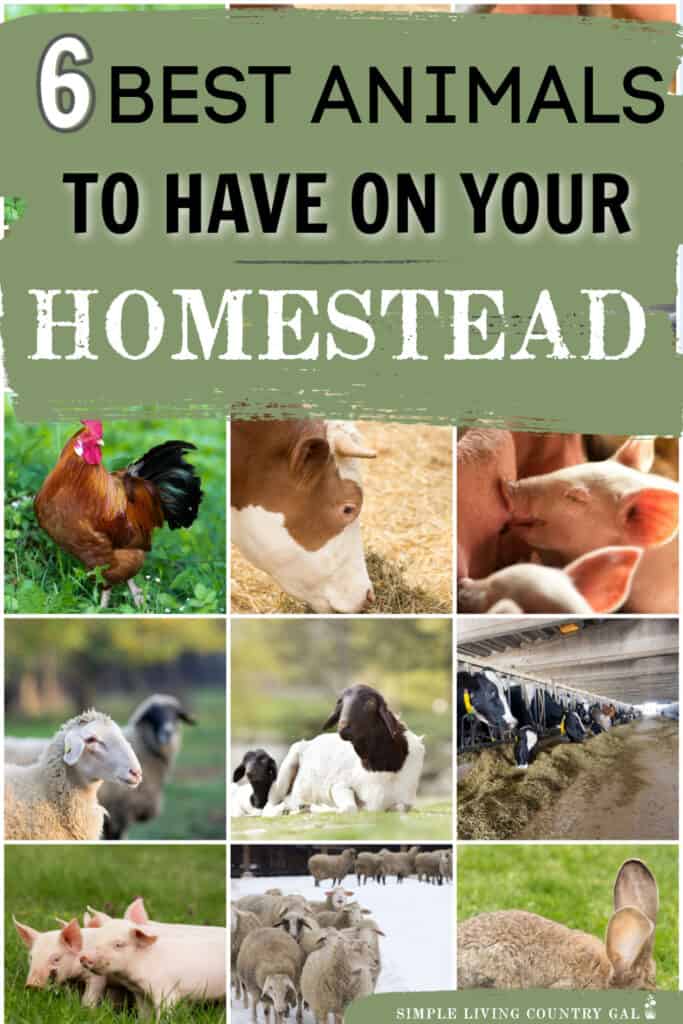
With all the conveniences of modern living, homesteading may not be the easiest way to live your life. But if you’re looking to cut your ties to grocery stores and fill your freezer and pantry with the best food available, it is something you will want to consider.
What is homesteading?
Homesteading is living a life of self-sufficiency. It is growing and raising the food you and your family routinely eat. It has you less dependent on the stores keeping you home, relying on your own devices to live a healthy and happy life.
With so many animals out there, knowing how each will impact a homestead will help you to choose the best ones for you and where you live. Some animals, for example, will thrive in cold climates, while others do best in hot, dry ones.
Know the best options for you so you can make the best choice.
Best Animals for Homesteading
Let’s go over the most common animals that are found on family homesteads. As you are reading, list the ones you want to do additional research on. This list is just an overview, an introduction to help you fine-tune what you hope to start out with.
Chickens
Raising chickens is a great way to get started raising your own food; they don’t require a lot of space and can be fairly easy to care for. In addition to providing plenty of eggs for your family, depending on how many hens you raise, you will also have enough extras to sell outside of your home. You can also raise a rooster so you have fertilized eggs. These eggs can be hatched using an incubator and then sold to others who are looking to start a chicken coop themselves.
Chickens can also be raised for meat, giving you a freezer of organic poultry.
Getting started raising chickens will require a cost investment to set up, but if you choose to free-range your flock, the cost will be low to maintain them.
Pros of chickens:
- Easy to raise, needing little animal experience to get started.
- Eggs are great to sell as they are in high demand right now.
- Chicks are inexpensive to purchase.
Cons of chickens:
- A cost investment to build the coop and run, along with all the parts needed inside.
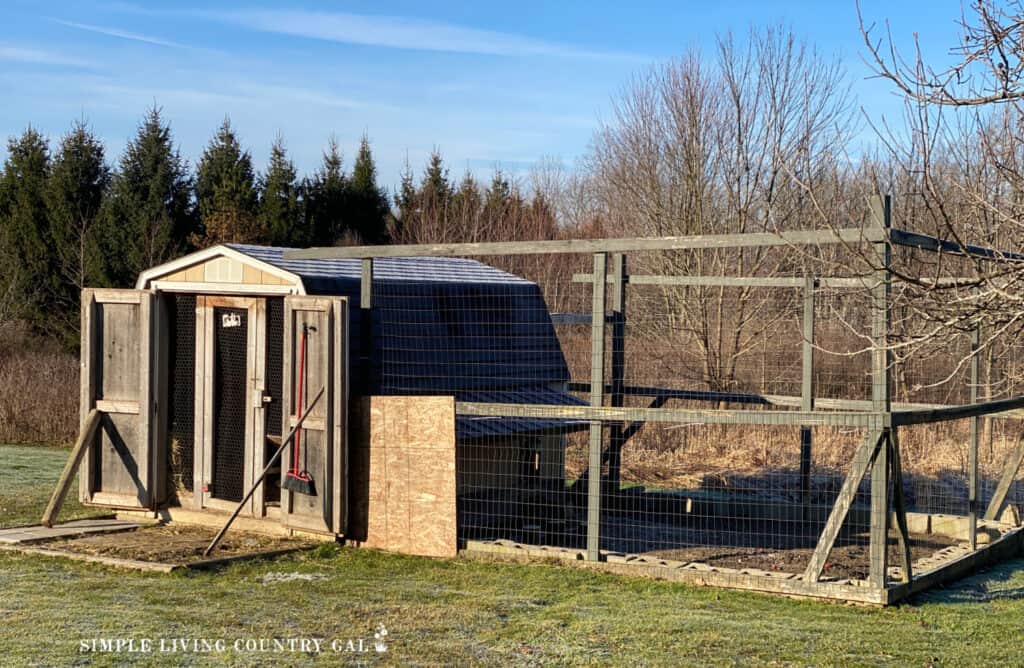
Goats
Goats can be another great animal to keep on your homestead. They are perfect if you have a lot of space for them to graze on, but they will also do well if you only have a small area available. You can supplement with hay if your grazing area is limited, and they will do quite well this way.
They can be self-sufficient if you have plenty of space for them to forage and eat, but if your yard is small, as long as you feed them daily, they’re happy. Goats enjoy both weeds and grass, making them a great option for anyone who is looking to clear an overgrown area.
There are many breeds of goats, and knowing what you plan to use them for will help you decide on the best one.
• Some goat breeds, called dairy goats, are great for their milk which you can use to make butter, yogurt, cheese, fudge, and even soaps and lotions.
• Some goat breeds, called meat goats, are a great source of meat that you can use to fill your freezer or sell for additional income.
• Some goat breeds are ideal for providing fleece for clothing and yarn. Something that you can sell easily online in feeze market places.
Goat Breed Resources:
Depending on the variety, goat kids can be sold for up to $500 each, providing a nice source of income. Local 4H kids are always looking for goat kids to purchase each spring for showing and will pay top dollar for good quality stock.
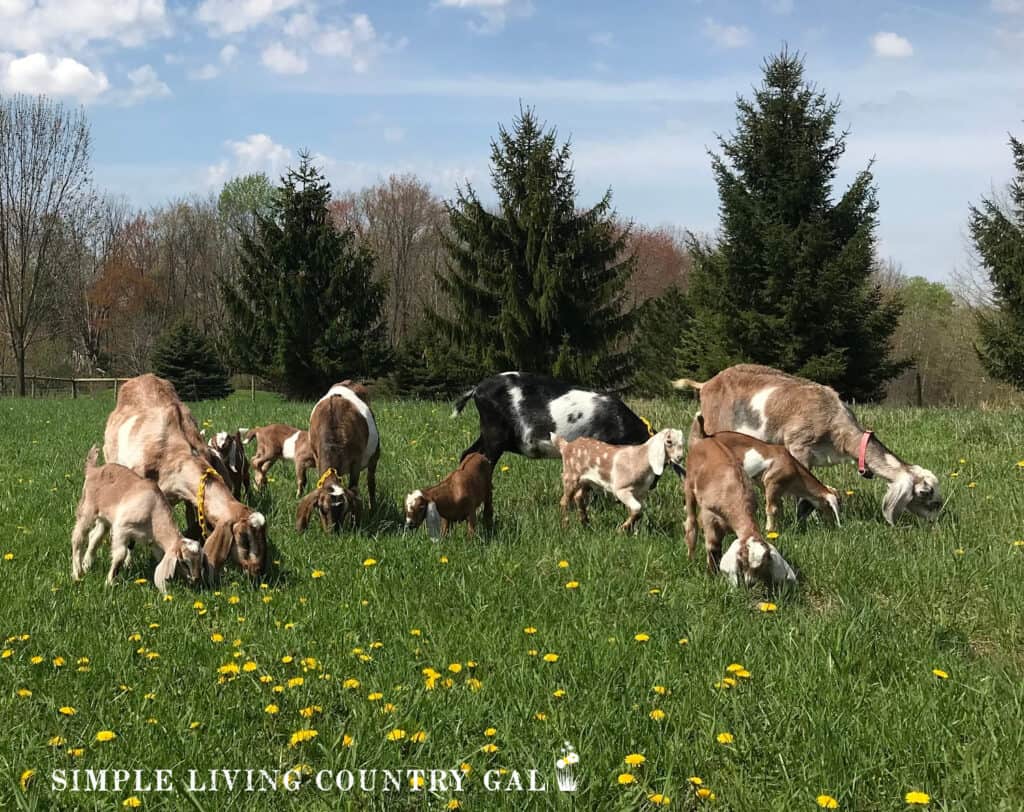
Pros of Goats
- They are pretty self-sufficient if you have a pasture for them to graze in daily.
- They are a great option for milk because they are more compact than a cow but will still give a large quantity.
- Goats are loving animals so much so, that many folks keep them as pets.
Cons of goats
- There is a cost investment for their shelter as goats must be kept out of bad weather year-round.
- There is also a cost investment for the fencing that you will need to contain them.
- To keep the milking flowing, you will need to breed your dairy goats every year.
- If you breed your goats, you will need to know basic vet care to help if there are any complications during kidding.
- Some goat breeds can be loud, which may annoy any close neighbors.
Sheep
Sheep require a little more work than goats as they will need to be sheared each spring. Shearing is the process of cutting off the fleece of a sheep all the way down to their skin.
The sheared wool can be spun into yarn for crocheting or knitting or sold as is as a great income generator. Sheep can also be milked, which is becoming more popular as the milk is great for making delicious cheeses.
Sheep also provide meat that you can eat yourself or sell to others. Finally, the lambs can be sold, providing a source of income. Just like with goats, local 4H kids are always looking for young lambs to purchase each spring for showing.
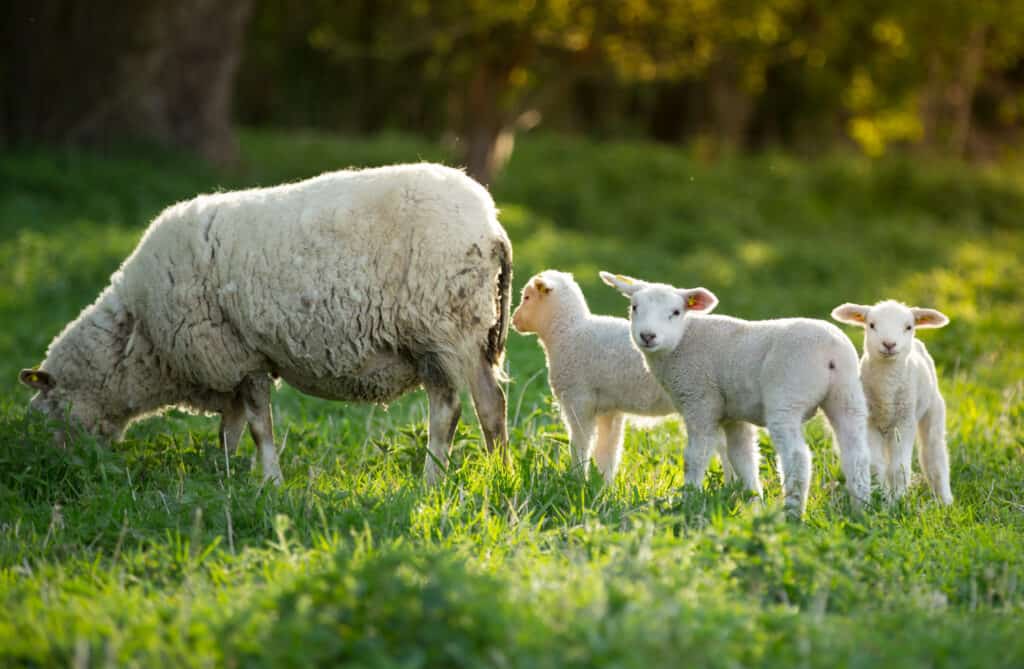
Pros of sheep
- An excellent income generator because of the fleece that can be sold locally or online.
Cons of Sheep
- Just like with goats, sheep require a year-round shelter along with a fenced in area for grazing.
- If you breed your goats, you will need to know basic vet care to help if there are any complications during kidding.
Rabbits
Rabbits are a good option for your homesteading, especially if you live within city limits, because most locations allow them. They also require very little space and are inexpensive to raise. They can live in cages, but if you have enough space for them to roam, they can be very self-sufficient.
Since they have a short gestational period, about 25-28 days, and are ready to butcher at 10-12 weeks, they can provide plenty of meat each year for your family. You can also breed rabbits for selling as pets or to kids that are in the local 4H.
Pros of Rabbits
- Require little space to raise.
- Make no noise, making them a good choice if you have neighbors nearby.
Cons of Rabbits
- If you are not careful, you can end up with a ton of babies. You will need to keep the males from the females to control breedings.
Bees
Bees can be raised almost anywhere, making them a popular choice for many new homesteaders. The honey they provide is one of the healthiest and oldest foods that humans consume from animals. Did you know that honey never goes bad? That’s crazy when you think about it!
Raising bees requires little time from you as they regulate their own hives. Honey is a natural alternative to processed sugar, making it popular with many people. The honeycomb is also edible and a healthy additive to smoothies. Beeswax can be used in ointments and candles that you can make and sell for an extra income.
There are a lot of advantages to raising bees in addition to the wonderful honey they produce that you can enjoy as well as bottle and sell. You can also make products to use and sell with honey and beeswax. Hives can be sold to people who want to start raising bees. And if this isn’t enough, they can also help pollinate your garden to increase the production of fruits and vegetables.
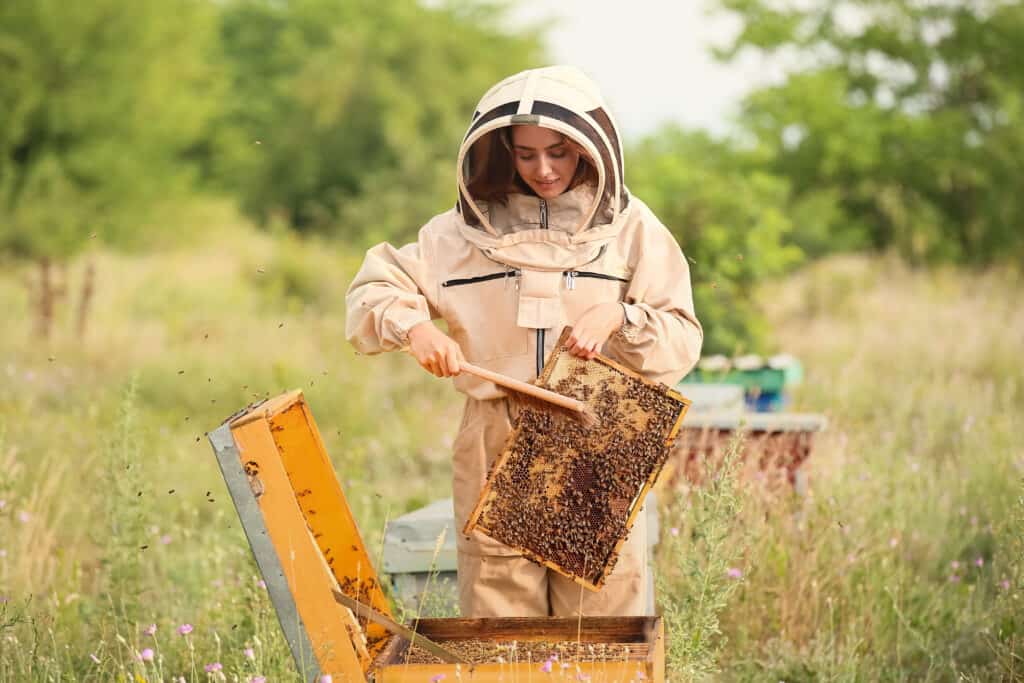
Pros of Bees
- Self-sufficient
- Honey is amazing and never goes bad.
- Honey is popular and in high demand.
Cons of Bees
- There is a lot of equipment you will need to have to handle the bees. You can purchase a bee-keeping kit before you get started.
- You will need to know a bit before you start raising bees.
Pigs
Pigs are a fun addition to a homestead and are mainly raised for meat. There is nothing as wonderful as home-raised pork. The life of a pig is very short, meaning you will get the piglets in early spring and butcher them in the late fall. Many homesteads do not raise pigs over winter as this can be costly to feed them.
Pigs will need a shelter and a small area to root and rest in. Pigs can be destructive, so you will want to keep this in mind when choosing their home.
Pigs love scraps and will gladly eat vegetable cuttings, fruit rinds, and any garden excess. There is nothing quite as comical as a pig enjoying pumpkins left over from Halloween carvings.
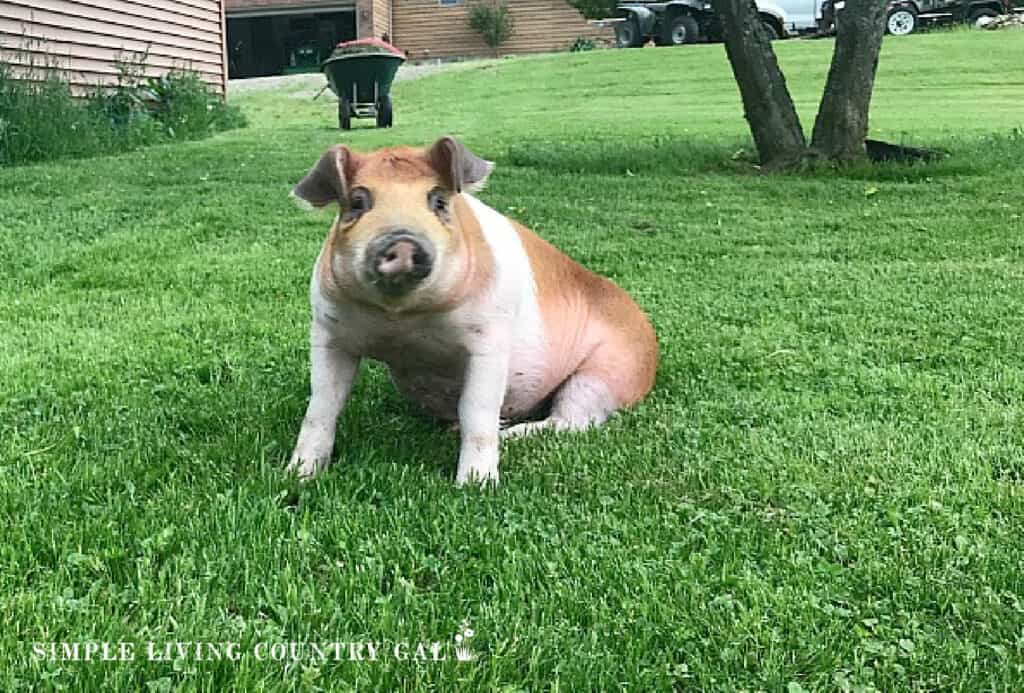
Pros of Pigs
- They only need 8-10 months before they are ready to butcher.
- The meat is amazing, and one pig can feed a small family for the year.
- Pork is in high demand and very easy to sell at a profit.
Cons of Pigs
- They can be destructive and turn a nice piece of ground into a muddy mess in just a few days.
Cows
Cows are one of the most space-consuming animals to raise, but what they can give to a family may be worth it. They will need plenty of space to graze, about 2-3 acres per cow for grass-fed cows. If you don’t have space for them to graze, you’ll need cow feed and hay, which will increase the cost of caring for them.
If you haven’t raised animals before, it’s probably best to start with something smaller, like goats or sheep. Cows don’t require a lot of time, but if you’re raising dairy cows, they will need to be milked once or twice a day. They also require appropriate shelter that they can use throughout the year.
Cows are a great source of milk, producing up to a gallon or more at each milking. You can use the milk to make yogurt, ice cream, butter, and cheese. They are also a great source of meat, enough to easily feed a large family for a year. The meat and dairy can be sold to provide a good source of income.
Calves can be sold as well to a local family or a child who is involved with 4H.
Pros of Cows
- Are self-sufficient unless you are milking them.
- They are pretty hardy and have few issues to deal with.
Cons of Cows
- They require a lot of grazing space.
- If milking, you will need to do so 1-2 times every day.
- To keep the milking flowing, you will need to breed your cows every year.
- You will need to know basic vet care to help if there are any complications during calving.
Raising farm animals is a great way to make your homestead self-sufficient, but it does require some work, a lot of research and knowledge, and in some cases, special shelters and/or large, open spaces.
Before committing, make sure you know what the animals you are going to add along with their needs as far as shelter, feed, care, and any issues that you may need to help with. This includes worms, sick care, breeding, and help when delivering the babies.
I hope this overview of the best animals for homesteading is enough to get you started narrowing down your list so you can prepare. Once you are ready you can bring your first livestock home and begin raising the food you and your family enjoy.
More Homesteading Resources:
- How to Vacation With a Homestead
- How to Keep Animals Cool in the Summer
- How to Reuse Eggshells Around Your Homestead
